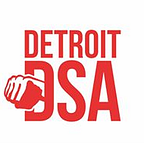Troublemakers go to school
by Danielle Aubert and Michelle Emfinger
On Saturday 100 union members, labor activists, and allies met on the Wayne State campus for a Troublemakers School sponsored by the national publication Labor Notes: a day of skill-sharing and strategizing about workplace organizing. Detroit DSA-ers helped with the planning for the day, which drew participants from as far as Kalamazoo and Lansing. Sixteen DSA members were in the mix.
Though it was gray and drizzling outside, the energy at Troublemakers School was strong all day, closing out with a call from Rashida Tlaib to continue fighting alongside her. Detroit DSA co-chair Natasha Fernandez-Silber spoke about how the Green New Deal could be enacted in the Rust Belt: “We need light rail, we need electric buses, we need electric vehicles. Let’s do it here.”
Fernández-Silber also elaborated on Detroit DSA’s call for the creation of a Great Lakes Authority that would provide a just transition to sustainable energy and economic dignity for workers. DSA and UAW-GM member Sean Crawford elaborated: “We have the know-how, we have the facilities, we can make solar panels, we can make wind turbines. Why not make it here?” Tlaib reminded us that in Detroit, “we are on the front lines of what it means to do nothing,” and that when people say we ONLY have 12 years left, it ignores the reality that the crisis here has already arrived in places like Detroit.
Unifor 222 member Rebecca Keetch from the plant that GM is closing in Oshawa, Canada called for the nationalization of GM, and urged unions to think big, as Detroit DSA is with the Green New Deal and the Great Lakes Authority. To see these speakers explain how the Green New Deal is a workers’ issue, go to the Labor Notes blog.
These inspiring talks followed a day of skill-building workshops. The morning began with Debby Pope, of the Chicago Teachers Union, describing how when she first started teaching, the union leadership was out of touch with rank-and-file teachers. She joined with a group who decided that “instead of having a union that you go to when you have a problem, we [were] going to have an organizing union, and put the U back in union.”
The Chicago Teachers Union won a week-long strike in 2012, which set a precedent for the recent wave of teachers strikes that has crossed the country from West Virginia to Arizona to Oakland. Pope said most teachers would be happy to stay in their classrooms, teaching their kids, but the attacks on public education have brought them into the streets to defend everyone’s right to a public education: “We are going to keep being out on the streets until we get what everybody needs.”
ALL WALKS OF LIFE
Troublemakers School drew a diverse mix that ranged from auto workers and electrical workers to teachers, librarians, and university faculty to social workers, bus drivers, city workers, and nurses. There were not-yet-unionized workers as well as members of UAW, IBEW, AFT, IWW, Transport Workers, and Teamsters, among others. Attendees joined workshops with titles like “Beating Apathy,” “Race and Labor: Let’s Talk About It,” “Assertive Grievance Handling,” and “Successful Contract Campaigns.”
In the Assertive Grievance Handling workshop, participants began by defining what a grievance is (a formal complaint brought to the union by a worker). People broke into pairs to compare notes on how grievances are handled in their own locals.
During group discussion there was recognition that most of the time, filing a grievance is a solitary process between the aggrieved worker, the union rep, and the employer. Few people outside the process are aware it is even happening. There were many union reps and shop stewards in the room who had been through the grievance process — often it requires them to think like lawyers, interpreting opaque contract language.
But the grievance process can be an organizing tool. A grievance can be made public to build support around an issue that is widely felt. While most unions cannot legally go on strike during the term of a contract, it is possible to file grievances strategically.
In another workshop, “Beating Apathy,” the training focused on strategies and tips to use in organizing, starting with how to identify a good organizing issue. Exercises and role-playing gave everyone the opportunity to practice techniques for listening and motivating others to get involved.
Hearing about challenges from various participants was a good reminder that there are many commonalities in workplace struggles. A social worker explained that it was a new realization for many of her co-workers that they are also “workers” and share challenges such as stagnating wages and loss of benefits.
One participant said, “I walked out of that conference feeling empowered, which is the opposite of what I typically feel walking out of [school] district events that leave me feeling demoralized and hopeless.”
